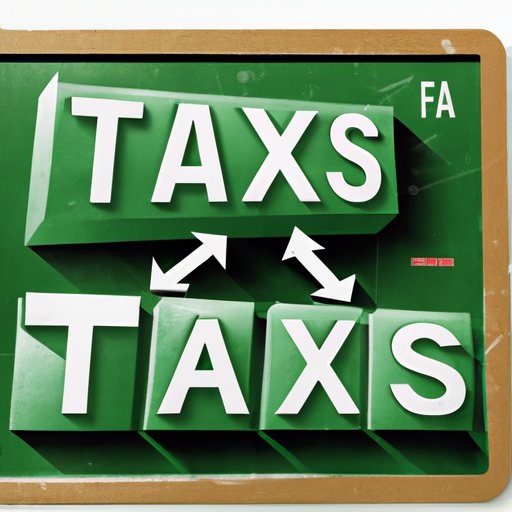The Importance of Taxation: Why Governments Collect Taxes
“The only things certain in life are death and taxes.” This famous quote attributed to Benjamin Franklin highlights the pervasive nature of taxation in our lives. Taxes are an unavoidable aspect of modern society, but have you ever wondered why governments levy them? In this article, we will explore the historical, economic, political, environmental, and technological aspects of taxation to gain a deeper understanding of why taxes are necessary. Read on to discover the importance of taxation!
The Historical Context
The practice of taxation dates back to ancient civilizations such as Egypt and Mesopotamia, where taxes were collected in the form of food and labor. In medieval Europe, feudal lords collected taxes from subordinates, while monarchies levied taxes on their subjects. The modern era of taxation began in the 19th century with the growth of the state and development of industrial economies.
Since then, taxation has undergone numerous changes, with variations in the type of taxes levied, the rates at which they are imposed, and the methods used to collect them. The first personal income tax was introduced in England in 1799 during the Napoleonic wars, and the United States implemented its income tax in 1913. War has often been the impetus for tax reform, with taxes being used to finance military campaigns.
The Economic Benefits of Taxes
Taxes play a crucial role in financing public goods and services such as education, healthcare, transportation, and national defense. Public goods are those that are non-excludable, meaning that it is difficult to exclude people from using them, and non-rival, meaning that an individual’s use of the good does not diminish its availability to others. These characteristics make it difficult for private markets to provide them efficiently, and hence, government intervention is required.
In addition to financing public goods, taxes can be used for wealth redistribution, with the aim of reducing income inequality. Progressive tax systems, where higher earners pay a higher percentage of their income in taxes, can help redistribute wealth and reduce poverty.
Taxes can also help control inflation. When authorities increase taxes, it can reduce the amount of money in circulation and decrease inflationary pressures. Similarly, reducing taxes can lead to an increase in disposable income, which can stimulate spending and boost economic growth.
The Political Perspective
To govern is to tax, and taxes play a significant role in shaping and expressing political power. Tax policies can be used to influence economic growth, redistribute wealth, and implement social policies. Political figures who introduce tax policies are often judged based on their impact on society and the economy. For example, U.S. presidential candidates often campaign on tax policies, promising tax cuts or increases to gain support from voters.
Tax policies can also lead to political slogans and campaigns. President Trump’s 2016 campaign, for example, included a promise to “Make America Great Again” by implementing tax cuts and simplifying the tax code.
International Comparisons
Taxation systems vary widely across countries, with differences in the types of taxes levied, the rates at which they are imposed, and the methods used to collect them. Comparing tax systems between countries can lead to insights about what works and what doesn’t, and what policies can be used to improve them.
For example, some countries have implemented flat tax systems where everyone pays the same tax rate, while others have progressive tax systems. Some have high tax rates, while others have low tax rates. Comparing the effectiveness of these different systems can help policymakers make informed decisions about the optimal taxation structure for their country.
Environmental Considerations
Taxation policies can be used to address environmental problems such as climate change and pollution. Carbon taxation, for example, is a policy that aims to reduce greenhouse gas emissions by imposing a tax on the amount of carbon emitted. The idea is that by raising the cost of emitting carbon, individuals and companies will reduce their carbon footprint.
Other environmental taxes include taxes on plastic bags, gasoline, and landfill waste. These taxes aim to reduce waste and encourage individuals and companies to adopt more sustainable practices. However, the effectiveness of these policies is up for debate, and critics argue that it simply places a burden on the public without any significant environmental benefit.
The Role of Technology in Taxation
Technology has revolutionized the way taxes are collected. Gone are the days of filling out forms and mailing them to the government. Today, many governments have online portals and apps that allow individuals and businesses to file their taxes electronically.
Technology has also made taxes more efficient and effective. With the use of software, taxes can be calculated accurately and quickly, reducing the chance of errors. Similarly, technology has made it easier for governments to track down tax evaders and enforce tax compliance.
Critics of Taxation
Not everyone believes that taxation is necessary or beneficial. Libertarian schools of thought, for example, argue that taxation violates individual freedom and property rights and that government services would be better provided by the private sector. Similarly, some economic schools of thought argue that taxation can stifle economic growth by reducing incentives to work and invest.
Despite these criticisms, taxation remains an essential aspect of modern society. Without taxes, governments would not be able to provide public goods and services, redistribute wealth, or address social and environmental issues.
Conclusion
In conclusion, the importance of taxation cannot be overstated. Taxes are essential for financing public goods and services, redistributing wealth, and addressing social and environmental issues. Taxation has a long and fascinating history, and it plays a significant role in shaping and expressing political power. Technology has revolutionized the way taxes are collected, making the process more efficient and effective. Critics argue that taxation is unnecessary or harmful, but without taxes, government services and public goods would be impossible to provide. As citizens, it is important to understand the role of taxes in society and how they impact our daily lives.
